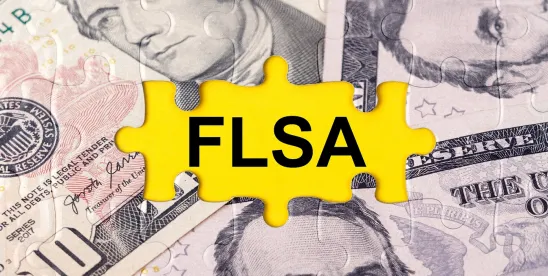This article is an update to “Understanding the New FLSA Overtime Rule: What Employers Need to Know.”
As you know, on April 23, 2024, the Department of Labor (DOL) issued a Final Rule modifying nationwide overtime rules under the Fair Labor Standards Act (FLSA). The Final Rule increased the salary thresholds in the salary level test for highly compensated and white-collar employees. Under the new Final Rule, salary thresholds for both highly compensated and white collar employees increased in two stages, with the first increase already occurring as of July 1, 2024, and the second increase set to occur on January 1, 2025.
On November 15, 2024, in State of Texas v. Dep’t of Labor, 24-cv-468-SDJ, the United States District Court for the Eastern District of Texas vacated the April 2024 Final Rule.
The district court’s ruling vacates the Final Rule in its entirety on a nationwide basis, including the portion of the rule that went into effect on July 1, 2024, as well as the further increase set for January 1, 2025. This effectively reverted the FLSA minimum threshold for white collar employees back to $35,568 and highly compensated employees back to $107,432.
In its decision, the district court recognized a two-month-old decision by the Fifth Circuit in Mayfield v. United States Department of Labor, 117 F.4th 611 (5th Cir. 2024), which upheld the 2019 increase. In Mayfield, the Fifth Circuit concluded that Congress had “explicitly delegated authority to define and delimit the terms of the [e]xemption.” However, while the Eastern District acknowledged Mayfield, it nevertheless concluded that, while the DOL has the power to impose some limitations on the scope of terms identified in the white collar exemption, it does not have the authority to “enact rules that replace or swallow the meaning those terms have.”
Significantly, the court also relied upon the recent U.S. Supreme Court decision in Loper Bright Enterprises v. Raimondo, stating that “[c]ourts must exercise their independent judgment in deciding whether an agency has acted within its statutory authority.” 144 S.Ct. 2444, 2273 (2024). Loper Bright is the much-publicized case that overturned the Chevron doctrine, which required courts to defer to an agency’s interpretation of the law. As such, Texas may just be the tip of the iceberg when it comes to battles between courts and agencies.
The Texas court reasoned that while the DOL can use a minimum salary threshold, it cannot do so in a manner that disrupts the other factors considered for the above-described exemptions. Under the court’s interpretation, the April 2024 Final Rule disturbed the balance of other factors, effectively making “salary predominate over duties for millions of employees.”
While this decision may have national implications, it is unclear whether the DOL will appeal the decision. In the meantime, the April 2024 Final Rule sits in limbo. Now, the question on everyone’s mind is simple: “What do we do with employees whose salary we changed in order to comply with the July 1, 2024 increase?”




 />i
/>i

